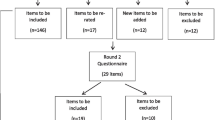Abstract
Significant disparities exist in both access to and quality of mental health care for Latino Americans with depression compared to Caucasians, resulting in a greater burden of disability in this underserved population. Our aim is to evaluate participant acceptability of a Culturally Focused Psychiatric (CFP) consultation program for depressed Latino Americans. Latino American adult primary care patients endorsing depressive symptoms on a screening questionnaire were targeted in their primary care clinic. The intervention addressed participants’ depressive symptoms using culturally adapted clinical assessments and toolkits. Acceptability was evaluated using a treatment satisfaction scale and in-depth semi-structured interviews. Overall, 85 % of participants responded positively to all questions of the satisfaction scale. In in-depth interviews, the vast majority of participants reported the program met expectations, all stated providers were culturally sensitive, and most stated recommendations were culturally sensitive. The CFP program was found to be acceptable to a group of depressed Latino American primary care patients. Further research is needed to evaluate if the CFP intervention can improve depressive symptoms and outcomes.

Similar content being viewed by others
References
Mental Health: Culture, Race, and Ethnicity. US Department of Health and Human Services. 2001. Available at http://www.ncbi.nlm.nih.gov/books/NBK44243/.
Smedley BD, Stith AY, Nelson AR. Unequal treatment: confronting racial and ethical disparities in health care. Washington, DC: Institute of Medicine; 2002.
Atdjian S, Vega WA. Disparities in mental health treatment in US racial and ethnic minority groups: implications for psychiatrists. Psychiatr Serv. 2005;56(12):1600–2.
Alegria M, Chatterji P, Wells K, et al. Disparity in depression treatment among racial and ethnic minority populations in the United States. Psychiatr Serv. 2008;59(11):1264–72.
Gonzalez HM, Vega WA, Williams DR, et al. Depression care in the United States: too little for too few. Arch Gen Psychiatry. 2010;2010(67):37–46.
Cooper LA, Gonzales JJ, Gallo JJ, et al. The acceptability of treatment for depression among African-American, hispanic, and white primary care patient. Med Care. 2003;41(2):479–89.
Alegria M, McGuire T. Rethinking a universal framework in the psychiatric symptom-disorder relationship. J Health Soc Behav. 2003;44:257–74.
Hansen MC, Cabassa LJ. Pathways to depression care: help-seeking experiences of low-income Latinos with diabetes and depression. J Immigr Minor Health. 2012. Available at http://www.springerlink.com/content/g8n07820k4vxmv56/.
Hails K, Brill CD, Chang TE, et al. Cross-cultural aspects of depression management in primary care. Curr Psychiatry Rep. 2012;14(4):336–44.
Pingitore D, Snowden L, Sansone RA, et al. Persons with depressive symptoms and the treatments they receive: a comparison of primary care physicians and psychiatrists. Int J Psychiatry Med. 2001;31(1):41–60.
Trinh NH, Bedoya CA, Chang TE, et al. A Study of a culturally focused psychiatric consultation service for Asian American and Latino American primary care patients with depression. BMC Psychiatry. 2011;11:166.
Kroenke K, Spitzer RL, Williams JB. The Patient Health Questionnaire-2: validity of a two-item depression screener. Med Care. 2003;41(11):1284–92.
Yeung A, Trinh NH, Chang TE, et al. The Engagement Interview Protocol (EIP): improving the acceptance of mental health treatment among Chinese immigrants. Int J Cult Ment Health. 2011;4(2):91–105.
Barrett JE, Dietrich AJ, Eisenberg L, et al. Depression management toolkit. The MacArthur initiative on depression and primary care. 2009. Available at http://www.depression-primarycare.org/images/pdf/macarthur_toolkit.pdf.
Betancourt JR, Green AR, Carrillo JE, Ananeh-Firempong O. Defining cultural competence: a practical framework for addressing racial/ethnic disparities in health and health care. Public Health Rep. 2003;118(4):293–302.
SPSS Inc. SPSS statistics for windows, version 17.0. Chicago: SPSS Inc.; 2008.
Neuendorf KA. The content analysis guidebook. Thousand Oaks: Sage Publications; 2002.
Ayanian JZ, Zaslavsky AM, Guadagnoli E, et al. Patients’ perceptions of quality of care for colorectal cancer by race, ethnicity, and language. J Clin Oncol. 2005;23(7):6576–86.
Bartels SJ, Coakley EH, Zubritsky C, et al. Improving access to geriatric mental health services: a randomized trial comparing treatment engagement with integrated versus enhanced referral care for depression, anxiety, and at-risk alcohol use. Am J Psychiatry. 2004;161:1455–62.
Gallo JJ, Zubritsky C, Maxwell J, et al. Primary care clinicians evaluate integrated and referral models of behavioral health care for older adults: results from a multisite effectiveness trial (PRISM-E). Ann Fam Med. 2004;2:305–9.
Bryan CJ, Morrow C, Appolonio KK. Impact of behavioral health consultant interventions on patient symptoms and functioning in an integrated family medicine clinic. J Clin Psychol. 2009;65:281–93.
Flaskerud JH. The effects of culture-compatible intervention on the utilization of mental health services by minority clients. Community Ment Health J. 1986;22(2):127–41.
Dwight-Johnson M, Lagomasino IT, Aisenberg E, et al. Using conjoint analysis to assess depression treatment preferences among low-income Latinos. Psychiatr Serv. 2004;55:934–6.
Griner D, Smith TB. Culturally adapted mental health intervention: a meta-analytic review. Psychotherapy (Chic). 2006;43(4):531–48.
Sue S, Zane N, Nagayama Hall GC, et al. The case for cultural competency in psychotherapeutic interventions. Annu Rev Psychol. 2009;60:525–48.
Serrano N, Monden K. The effect of behavioral health consultation on the care of depression by primary care clinicians. WMJ. 2011;10(3):113–8.
Lewin SA, Dick J, Pond P, et al. Lay health workers in primary and community healthcare. Cochrane Database Syst Rev. 2005;(1):CD004015.
Acknowledgments
The authors would like to thank the professional and support staff at the participating sites for their commitment and participation in the study: MGH Charlestown Healthcare Center, MGH Chelsea Healthcare Center, MGH Internal Medicine Associates, and MGH Revere Healthcare Center. The authors would also like to thank Drs. Joseph Betancourt and Alexander Green from the MGH Disparities Solutions Center for their contributions to the conception and design of the study, Jennifer Riconda and the MGH Development Office for their support of the grant, Dr. Jerrold Rosenbaum the chief of the MGH Department of Psychiatry for his support of the study, Dr. Susan Regan for her statistical support of the study, and Soo Jeong Yoon and Jenny Man for their technical assistance in the study. This manuscript was made possible through the support of the Robert Wood Johnson Foundation’s program, ‘Finding Answers: Disparities Research for Change’ (RWJF grant number 66709); Harvard Medical School’s Center of Excellence Health Disparities Post Graduate Fellowship (HDPG); Disparities Mentorship and Professional Support (D-MaPS) Enrichment Award from the Harvard Catalyst Health Disparities Research Program; and the MGH Department of Psychiatry.
Author information
Authors and Affiliations
Corresponding author
Additional information
This manuscript details a novel intervention found to be very acceptable to a group of Latino American patients with depression; it also provides key insights into a largely monolingual Spanish-speaking immigrant Latino American patient population in an urban primary care setting.
Rights and permissions
About this article
Cite this article
Trinh, NH.T., Hagan, P.N., Flaherty, K. et al. Evaluating Patient Acceptability of a Culturally Focused Psychiatric Consultation Intervention for Latino Americans with Depression. J Immigrant Minority Health 16, 1271–1277 (2014). https://doi.org/10.1007/s10903-013-9924-3
Published:
Issue Date:
DOI: https://doi.org/10.1007/s10903-013-9924-3




